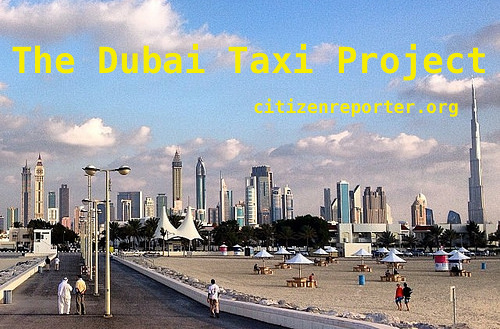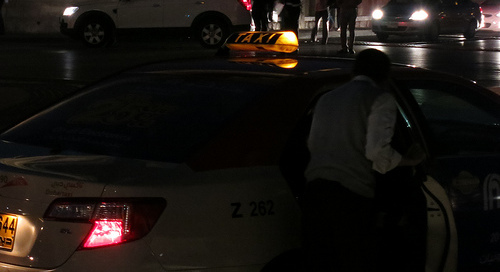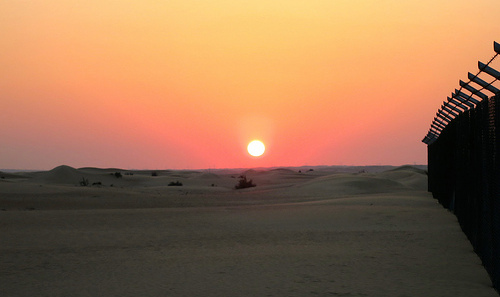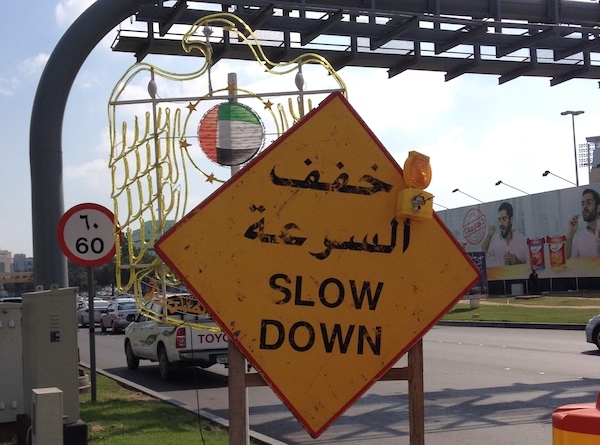Somewhere along the neverending Jumeirah Beach Road in Dubai, within view of world famous sky scrapers and people enjoying themselves on the beach, you’ll find a little oasis of healthy food and unique style. The place is Comptoir 102, a concept cafe created and run by my guests on today’s podcast: Alexandra de Montaudouin and Emma Sawko. While their place may not be far from downtown, this little cafe is in a very different world from the brand name corporate culture that took root in Dubai more than a decade ago.
Tag Archives: dubai
One Day Off Sir
It is a busy Wednesday evening near the Burj Al Arab, Dubai’s most recognized architectural symbol, and there is a line of taxis waiting for passengers. I position myself just out of view of the drivers and watch as people stream out of the shopping mall and into each taxi. Some drivers argue as they wait, something about a sloppy parking job. One guy gets out of the taxi and is waving his arms around in anger. He is speaking Urdu I think, with occasional English expressions mixed in. At one point I distinctly hear the gentleman shout towards another driver “go back to Pakistan!” Ironically I’m almost certain they are both Pakistani. No matter, anger is anger. An Indian gentleman in an official looking uniform comes over with an angry look on his face, he puts himself between the car and the angry man and orders the driver back into his car. He seems to scold them both. Suddenly the argument is over. Back in his vehicle, the frustrated driver revs the engine and dramatically pulls forward into the first position for the next possible pickup. I stay out of site, determined not to get into a cab with an angry driver.
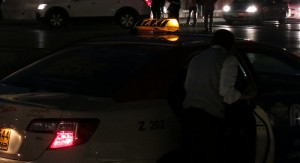 When I do finally see a cab that seems to eminate positive energy, I hop in and find myself seated next to Dev from Bangladesh. He and I are immediately interrupted by my phone, as a local photographer is calling to say he has been delayed by a helicopter crash. From my side of the phone I repeat his words in astonishment – “A Helicopter crashed?” – Dev turns his head towards me in a panic, “Sir, where?” The call gets disconnected and I tell him the little information that I know; there was a crash nearby. He politely asks me to call my friend back and ask for more info, there is an air of “concerned driver” and “curious citizen” in his voice. I tell Dev I haven’t got any credit left on my phone to call anyone, like a reflex he pulls out his phone and hands it to me, “please sir, feel free, you are my guest.” I’m stunned by his kindness and his passion to know about a helicopter crash somewhere on one of the exclusive closed-to-the-pubic islands. I make the call and even as I try to get more facts from my friend, Dev is whispering more questions to me, “casualties sir, any cusualties?” Based on the suffering tone in his voice, you would think he had family on the helicopter. A minute later I hung up the phone and explained that there isn’t much more information at this time. Dev looked forward at the bumper to bumper traffic with a defeated look on his face, “not much chance to survive that type of crash.”
When I do finally see a cab that seems to eminate positive energy, I hop in and find myself seated next to Dev from Bangladesh. He and I are immediately interrupted by my phone, as a local photographer is calling to say he has been delayed by a helicopter crash. From my side of the phone I repeat his words in astonishment – “A Helicopter crashed?” – Dev turns his head towards me in a panic, “Sir, where?” The call gets disconnected and I tell him the little information that I know; there was a crash nearby. He politely asks me to call my friend back and ask for more info, there is an air of “concerned driver” and “curious citizen” in his voice. I tell Dev I haven’t got any credit left on my phone to call anyone, like a reflex he pulls out his phone and hands it to me, “please sir, feel free, you are my guest.” I’m stunned by his kindness and his passion to know about a helicopter crash somewhere on one of the exclusive closed-to-the-pubic islands. I make the call and even as I try to get more facts from my friend, Dev is whispering more questions to me, “casualties sir, any cusualties?” Based on the suffering tone in his voice, you would think he had family on the helicopter. A minute later I hung up the phone and explained that there isn’t much more information at this time. Dev looked forward at the bumper to bumper traffic with a defeated look on his face, “not much chance to survive that type of crash.”
After a brief few minutes of silence, he asks me about my work. I explain my interest in people working in Dubai, especially taxi drivers. He seems surprised and pleased to hear this, he quickly lays out his main point that he would like the world to know:
“As you have surely seen, Dubai is a city that is very developed and there is so much to do, so much entertainment. It can be a very interesting place and a place where you can forget or enjoy some distraction in a cinema or some musical performance. But we taxi drivers, we work everyday of the week, 12 hours per day. We are tired, often in a bad mood, or else we are confronted with a customer who is in a bad mood and takes it out on us. What we really need is one day off per week. Everyone should have a right to that. One day of per week. That is my one wish I would tell the government and the company, one day off would benefit everyone involved.”
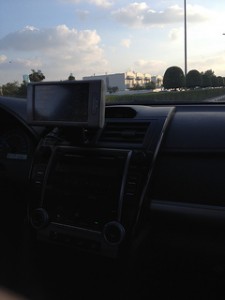 His statement was clear and simple, words that sounded like he had been crafting them over the past few years behind the wheel of this taxi. I suggested other possible ways to improve the spirit of taxi drivers but he insisted nothing else was important. “We have our salaries, or commission, and for us it is fine and it is enough to send home to our people. But it shouldn’t be so miserable all the time. We could enjoy one day to relax, recharge, and come back in good spirits. We would also be helping the economy by spending some money on entertainment. But the most important thing would be to improve morale. Because as you might have noticed, it is getting worse among drivers.”
His statement was clear and simple, words that sounded like he had been crafting them over the past few years behind the wheel of this taxi. I suggested other possible ways to improve the spirit of taxi drivers but he insisted nothing else was important. “We have our salaries, or commission, and for us it is fine and it is enough to send home to our people. But it shouldn’t be so miserable all the time. We could enjoy one day to relax, recharge, and come back in good spirits. We would also be helping the economy by spending some money on entertainment. But the most important thing would be to improve morale. Because as you might have noticed, it is getting worse among drivers.”
His point about morale rang especially true based on my almost 50 taxi rides over the course of 3 weeks. Though many drivers were modest and refused to complain, once you get them talking you hear about the pressure they are dealing with. It is not hard to notice a city wide depression slowly taking hold of these hard working individuals who take thousands of people from point A to point B everyday. Some passengers might feel like they are the victims of bad drivers who make mistakes or are dishonest in some way, but further research can easily reveal that this is a side effect of a high stress work arrangement. Yet right here in this 4 door sedan, a man named Dev from Bangladesh is laying out a clear plan for how to address this issue. It was the most constructive conversation about the job I had ever experienced.
As we make our way towards Jumeirah Beach Residence, Dev moves on to talking about marriage and the pains of being away from the person you love most in this world. He explained how he had married for love with a woman he met at university (bachelors degree in economics) and not by family arrangement, going against the tradition of his culture. He was proud of his decisions, including not having had a traditional wedding with hundreds of guests. “My wife and I agreed that we would not be wasting money on some huge traditional wedding, we wanted instead to use this to invest in a house and our future. This is seen as going against tradition but we didn’t care. Some traditions need changing,” he laughed at his own words.
Within 2 blocks of my destination traffic comes to a halt. Dev squints into the sea of tail lights and offers me advice, “You would have better luck walking from here, you’ll get there faster and you’re young, two blocks walking is good for your health.” We both laugh at the suggestion and I count out the money I owe him plus a little extra. Before I’m even done figuring out the money he surprises me by extending a hand to shake mine, “Can I tell you sir, it is a real pleasure to have had this time with you. Something really unexpected and enjoyable. Thank you so much and I’m going to pray for you sir.” I shake his hand and tell him he has taught me many things on this trip. Caught up in the moment, despite not being religious, I tell him I will pray for him and his family as well; that they have good health and a wonderful future together. As I open the door, another customer is ready to get in. I pause and tell her, “Take care of him, he’s a great person!”
Ali Al Saloom: Connecting the World with Emirati Culture
Ali Al Saloom, better known on the internet as Ask Ali, came on the scene in the same way many of us podcasters, bloggers, and other independent content creators did over the past 10 years; with an idea and a dream. His goal, to teach the world about his people and his culture, to dispel myths and contribute factual information about the UAE. The result: thousands of published answers to all kinds of questions about the UAE, a successful cultural consultancy service, and an internationally recognized representative of a country and a culture that until recently were little known or poorly understood
A pioneer in both new media and internet outreach, Ali can run down the list of reasons people around the world are coming to this region and he is proud of what his nation has accomplished. At the same time he sees the risks and responsibilities that come with success and wealth, as he talks about the things that concern him in the near future.
While much of my journey has been about taxi drivers and the wisdom they can share about this place and life as a whole, a conversation with Ali Al Saloom provides a rare chance to hear from a citizen of this nation and to learn from his unique experience.
My Home Will One Day Be A Country
He’s young and soft spoken , and asks where I am from. When I mention Portugal, he smiles “We are neighbors. I am from Morocco.” We speak a bit about that country and its more famous cities and he soon corrects himself, “actually I am not Moroccan, I am Saharan. But it is a bad situation there, so I left many years ago.”
We’re heading south on Dubai’s busiest 14 lane artery known as Sheik Zayed Road. My driver is Jam, who has been driving taxi’s in Dubai for less than 6 months. He tells me this right from the start, so I tell him everything I know about getting to my destination. Together we agree on which is the best route to take. As we drive we pass many of Dubai’s most famous sky scrapers and countless shops with big brand names on them.
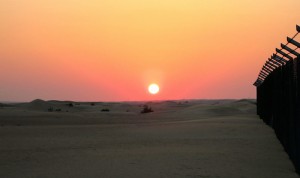 “This is a very good place to live and the job is decent. I’ve worked all over North Africa and the Middle East, this is the best place for me.” As he talks on, Jam stares forward at the road ahead, “I will bring my wife here as soon as possible. She is finishing her university studies in the field of tourism, there should be a job here for her.”
“This is a very good place to live and the job is decent. I’ve worked all over North Africa and the Middle East, this is the best place for me.” As he talks on, Jam stares forward at the road ahead, “I will bring my wife here as soon as possible. She is finishing her university studies in the field of tourism, there should be a job here for her.”
This is a rare plan from a Dubai taxi driver. Most are eager to tell my how soon they will stop the job or how they are waiting patiently for when its finally time to go home. With visas that make it hard to stay once the job is over, and a citizenship policy that leaves little hope for ever becoming a local, hardly anyone in their situation talks about making a life in Dubai for the long term. Even fewer talk about bringing their wives over from their home country. But then again, few other drivers come from a place that isn’t officially a country.
“I never went to University. The nearest one was 10 hours away by car. You would have to live there and my family didn’t have money for that.” — You’ve learned plenty from the school of life!- I say to him with a smile. He smiles back but doesn’t not seem to have understood or agreed with my words. When I suggest that it might be difficult to get permission to have his wife with him he shrugs off any doubts. In his eyes it is the right place to be and with her qualifications his wife will easily get a visa.
Jam is only the second Western Saharan I have ever met in my life, so I jump at the chance to ask him more about his homeland. Specifically about the POLISARIO people, a movement that has been working to end the Moroccan occupation since the 1970’s. “They are our brothers,” he assures me, and repeats this statement several times. “I hope one day my home will be a country, perhaps like this one. With its own Universities and Institutions, a place where we can live and work and have our families. That is my hope.” Again he repeats those last few words, but his tone changes to indicate some doubt, “that is my hope.”
We drive on for a few minutes in silence before the conversation comes back to how complicated the roads in new areas of Dubai can be. As we negotiate our route towards my destination near Jebel Ali, I’m still thinking about Jam’s situation compared to any other drivers. No country to go home to. A past marred by violence and struggle. To him Dubai is more than just a stop along the route of life, it is more than a source of money, to him this city could be the stable home and the fresh start he has long been searching for.
Loving a Job That Few Respect
Mr. A is a young man in his early twenties, but he refers to himself as an old driver. So it goes in a country where the average taxi driver has a contract of 3 or 5 years. Like many drivers he is a modest man and when I ask him about life, at first he says he leads an uninteresting life. But after a few minutes of talking about Dubai, we find just the opposite to be true. Unlike many people of the modern metropolis, Mr. A believes his life is just fine, especially after seeing the kinds of problems his passengers are carrying with them. Though respect is an issue and the stress is considerable, here is a man who’s number one matra is “I can’t complain, I have a good life.”
As we drive along the famed Jumeira Beach Road, passing alongside the world famous Burj al Arab, we talk about how he got started as a taxi driver. What his life was like in his home country. And what its like to love a job that so many people, including his own family, label as no good or unacceptable.
Things You See in an Abu Dhabi Courthouse
It is a Wednesday morning in the main courthouse of Abu Dhabi. Outside the Judiciary building there are hordes of people standing around smoking, talking on the phone, waiting around nervously. Their clothes are as diverse as their faces, with the familiar styles of Emerati Konduras (long flowing robe topped with either a head cover wrapped around the head or position over the head and held in place with that black rope) being the more dominate choice of clothing over the western business suit. I slip passed the metal detector after surrendering my phones, my bag is filled with recording equipment but this seems to be of no interest or concern to security. After all, beyond all those involved in legal proceedings, press people are also typical visitors here.
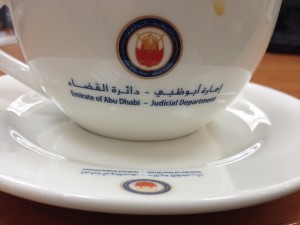 Once inside you arrive in a big square surrounded by several floors running in a circle. There are screens and signs in Arabic and English indicating things like “Bailiffs”, “Criminal Court”, “Prosecutors Office”, etc. Again anywhere you turn there is an Emirate gentleman on a phone, often wearing a light black cloth jacket over his normal clothes, which I am told indicates this person is a lawyer. Almost all the ladies present in the courthouse are wearing Abayas, some that cover there faces, others just covering the head. I am told even some non-Muslim ladies who come to court wear it in hopes of winning over the authorities. Every few steps there is also some kind of security officer. Many of them have unimpressive uniforms with the words “Security” on their backs, these people are often foreigners from India or Pakistan, and they speak with everyone in English. Then there are the men and women in military type uniforms, featuring golden ropes over their shoulders, camouflage type colors, and a few prestigious badges or bars on their chests.
Once inside you arrive in a big square surrounded by several floors running in a circle. There are screens and signs in Arabic and English indicating things like “Bailiffs”, “Criminal Court”, “Prosecutors Office”, etc. Again anywhere you turn there is an Emirate gentleman on a phone, often wearing a light black cloth jacket over his normal clothes, which I am told indicates this person is a lawyer. Almost all the ladies present in the courthouse are wearing Abayas, some that cover there faces, others just covering the head. I am told even some non-Muslim ladies who come to court wear it in hopes of winning over the authorities. Every few steps there is also some kind of security officer. Many of them have unimpressive uniforms with the words “Security” on their backs, these people are often foreigners from India or Pakistan, and they speak with everyone in English. Then there are the men and women in military type uniforms, featuring golden ropes over their shoulders, camouflage type colors, and a few prestigious badges or bars on their chests.
I’m being shown around by a friend rom 7 Days Dubai, who is a regular in this place. The Philippino ladies behind the counter of the cafe greet him like a preferred customer and as we walk around different lawyers and court reporters stop us for a quick word. As we walk by one hallway my friend gestures for me to observe carefully as there are men sitting on benches along the wall. “These men are often here because they fell into debt, which is a punishable offense in this country.” As we walk I notice these guys have a very hopeless and desperate demeanor about them, a few are even wearing leg chains, the kind you’d see a serial killer on trial in the US wearing to court.
On the way to criminal court we pass a door with two guards, and surrounding them are a mix of men and women staring nervously at the door something like when you’re at the arrivals gate of an airport waiting for someone to emerge. “These are family members hoping to see their detained loved one.” I take a second look at their concerned faces, I find myself imagining the kinds of charges their people face. Before I can think any further about it, we’re passing through another metal detector that seems to be more of a decoration. We pass through two double doors and directly into a moderately crowded courtroom with a case already in progress. There is a panel of judges sitting behind the long, raised desk, with the middle judge, an older gentleman with dark skin and a stern look, doing all the talking. Facing him and looking very concerned are two small podiums with middle aged men in western business suits who seem to be translating or arguing their case.
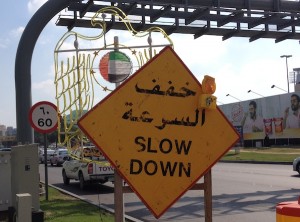 Despite having studied arabic, I’m struggling to understand what is going on. Thankfully there is a court reporter seated in our row and at the beginning of each case he gives us a quick rundown of what is going on. “This man is accused of drinking alcohol and partying,” inside the bullet proof booth I can see a short Emirati man wearing a uniform black shirt and a yellow stripe on his arm. The yellow stripe indicates a detainee facing a punishment of a year or less. Before I even understand if he is guilty or not the next case begins. The next case seems to be another man accused of drinking and partying, which makes me wonder if these aren’t the most typical charges this judge sees. This time an older woman wearing a colorful headscarf stands up in the audience and asks permission to submit some documents. Something about her somber and desperate demeanor tells me that it is her son’s freedom which hangs in the balance. The judge shows no sympathy, but hears her out, and eventually she is returned to her seat. 15 minutes later, two short Indonesian ladies in green abayas are standing at the podium in front of the judge. Alongside them is a translator relaying messages to and from the judge. In the glass box there is a middle aged man who’s body language tells me he is very nervous. Apparently somewhere between them there is an accusation of sex outside of marriage. The discussion is long but in the end, the judge says his piece and all parties are escorted out of the room by security guards. As the two timid ladies stand outside the courtroom we follow them. A female officer slaps ankle bracelets on each of them, and they shuffle awkwardly onto the elevator. We get in just behind them and considering what we just observed, it is a struggle to keep a conversation going as the elevator heads towards the ground floor.
Despite having studied arabic, I’m struggling to understand what is going on. Thankfully there is a court reporter seated in our row and at the beginning of each case he gives us a quick rundown of what is going on. “This man is accused of drinking alcohol and partying,” inside the bullet proof booth I can see a short Emirati man wearing a uniform black shirt and a yellow stripe on his arm. The yellow stripe indicates a detainee facing a punishment of a year or less. Before I even understand if he is guilty or not the next case begins. The next case seems to be another man accused of drinking and partying, which makes me wonder if these aren’t the most typical charges this judge sees. This time an older woman wearing a colorful headscarf stands up in the audience and asks permission to submit some documents. Something about her somber and desperate demeanor tells me that it is her son’s freedom which hangs in the balance. The judge shows no sympathy, but hears her out, and eventually she is returned to her seat. 15 minutes later, two short Indonesian ladies in green abayas are standing at the podium in front of the judge. Alongside them is a translator relaying messages to and from the judge. In the glass box there is a middle aged man who’s body language tells me he is very nervous. Apparently somewhere between them there is an accusation of sex outside of marriage. The discussion is long but in the end, the judge says his piece and all parties are escorted out of the room by security guards. As the two timid ladies stand outside the courtroom we follow them. A female officer slaps ankle bracelets on each of them, and they shuffle awkwardly onto the elevator. We get in just behind them and considering what we just observed, it is a struggle to keep a conversation going as the elevator heads towards the ground floor.
In the remaining time I had at the courthouse I watched everyone going about their business. To some it might seem chaotic, but in reality, my very experienced friend assures me, this is one of the most organized court systems in the Middle East. Still it seems quite outdated, especially accusations of sex out of marriage or drinking alcohol. Granted these things are forbidden for religious reasons, but it seems a great strain to keep them as courtroom worthy topics. Prison sentences for those who are in debt is also a troubling phenomenon. I’m told this happens even for small sums of money and none of the men in that hall way looked like high rollers burning money on purpose. I also wondered how you pay off a debt if you are in prison.
That same day I return to Dubai after spending 24 hours in AbuDhabi and see the very down to earth, straight talking Prime Minister of the UAE Sheikh Mohammed bin Rashid Al Maktoum being interviewed on CNN. After driving the reporter out of Dubai (himself) and into the desert, he talks about the court system. He acknowledges that the system is flawed and in some ways has not yet caught up to the reality of the UAE as an open place where people from all over the world live. Obviously he is the representative of the country and speaks with a certain degree of concern for public perception, but even still, interesting words from someone who has great influence over what happens to this country in the next 25 years.
Many of the successes of this city and this country are talked about and celebrated throughout the world. It is indeed something to behold and to some extent be inspired by. On the other hand it is important to remember there are still injustices in this country, many of which could be remedied. One visit to a courthouse can illustrate both sides of this complicated coin.
